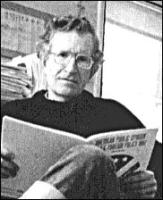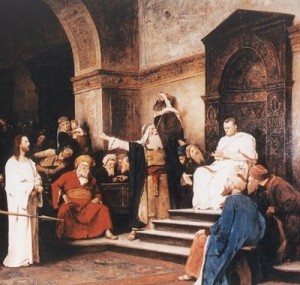 Many years ago, I was at a Clarification of Thought Talk at the local Catholic Worker House here in Boston. There, the speaker was Prof. Noam Chomsky. For those of you who don’t know, Prof. Chomsky was up until his retirement a professor of linguistics at MIT. He is more known, however, for his political outspokenness.
Many years ago, I was at a Clarification of Thought Talk at the local Catholic Worker House here in Boston. There, the speaker was Prof. Noam Chomsky. For those of you who don’t know, Prof. Chomsky was up until his retirement a professor of linguistics at MIT. He is more known, however, for his political outspokenness.
He maintains a theory that in a Democracy, the way the governments and corporations need to build consensus, since it cannot be forced, as in a dictatorship; is to manipulate the media so that it in a sense manufactures consent. (The name of one his books and a documentary based on the book, by the way.)
I am the son of a Boston Globe newspaper reporter (Pre-New York Times) and I grew up surrounded by the news business. I, incredulous, asked Prof. Chomsky, directly: “You are telling me that editors sit in newspaper offices and decide what they will tell the people? They will say ‘We will tell the people this, but not that’?”
He replied, “No, it does not happen that way.” Then he explained his position. He said that the higher one goes up in a company, the more the person buys the company line. So that by the time the person is at the level that he or she makes such decisions as one sees in an editorial session, that person is thinking the way the company has molded him/her to think and he or she has allowed him or herself to be molded. So they are thinking in the company line when they make the decision. His point was it was more at a subconscious level that such company based thinking happens.
You know, I have to admit, that I fully agree with his position.
Now, I want us to address this in a different way. In today’s gospel, we see a scene from John where Jesus and Pilate are in mutual confrontation. Before I return that that scene, let me bring up another. After Cardinal Karol Wojtyla became Pope John Paul II, he returned to his native Poland. There is a famous scene where the head of Poland General Jeruzelski was standing with the Pontiff. Now go back to what I said about the theory of Noam Chomsky. If you are going to be a leader of a nation behind the Iron Curtain, you don’t get there without buying into the group-think common among Soviet Era nations in Eastern Europe. (Poland  was, unlike other Eastern European Nations, not part of the USSR, but it was heavily influenced by the Soviets.) So here you have the most powerful man in Poland, clearly a powerful force in the Soviet Influenced sphere of the world on the other side of the Iron Curtain standing next to the Pope. The General’s knees were knocking in fear. The power of the gospel was greater than the political power.
was, unlike other Eastern European Nations, not part of the USSR, but it was heavily influenced by the Soviets.) So here you have the most powerful man in Poland, clearly a powerful force in the Soviet Influenced sphere of the world on the other side of the Iron Curtain standing next to the Pope. The General’s knees were knocking in fear. The power of the gospel was greater than the political power.
Today’s gospel shows again a high ranking government and military official Pontius Pilate, whom you can image is well within the group-think of the Roman Empire like the Polish General standing there in front of Jesus and vice-versa. Despite appearances to the contrary we learn who is the greater power. Today, indeed, the Church is alive, the Roman Empire no longer exists. Despite appearances to the contrary we see the greater power.
Despite appearances to the contrary we know who was the greater power, that embodied by Jesus, or that embodied by Pilate. We don’t know Pilate’s attitude. We do know, he tried desperately to get out from under this encounter with Jesus. He sought to do all he could to get away from condemning Jesus even to the point of washing his hands. He essentially does not pronounce a death sentence as much as give the Leaders permission to use the Roman men and facilities to bring forth their pronouncement of death.
Yet, still despite appearances to the contrary, we know the greater power.
Next week, there is an interesting passage in the gospel, where Jesus warns about not being led astray by three things: carousing, drinking and anxiety. Carousing and drinking are obviously understood, but anxiety. Yet, we know, and I know from experience, how much anxiety can destroy a person’s relationship with God and others.
Yet, isn’t it our call to remember the message here: Despite appearances to the contrary, we know the greater power over all things.
Photocredit Public Domain

